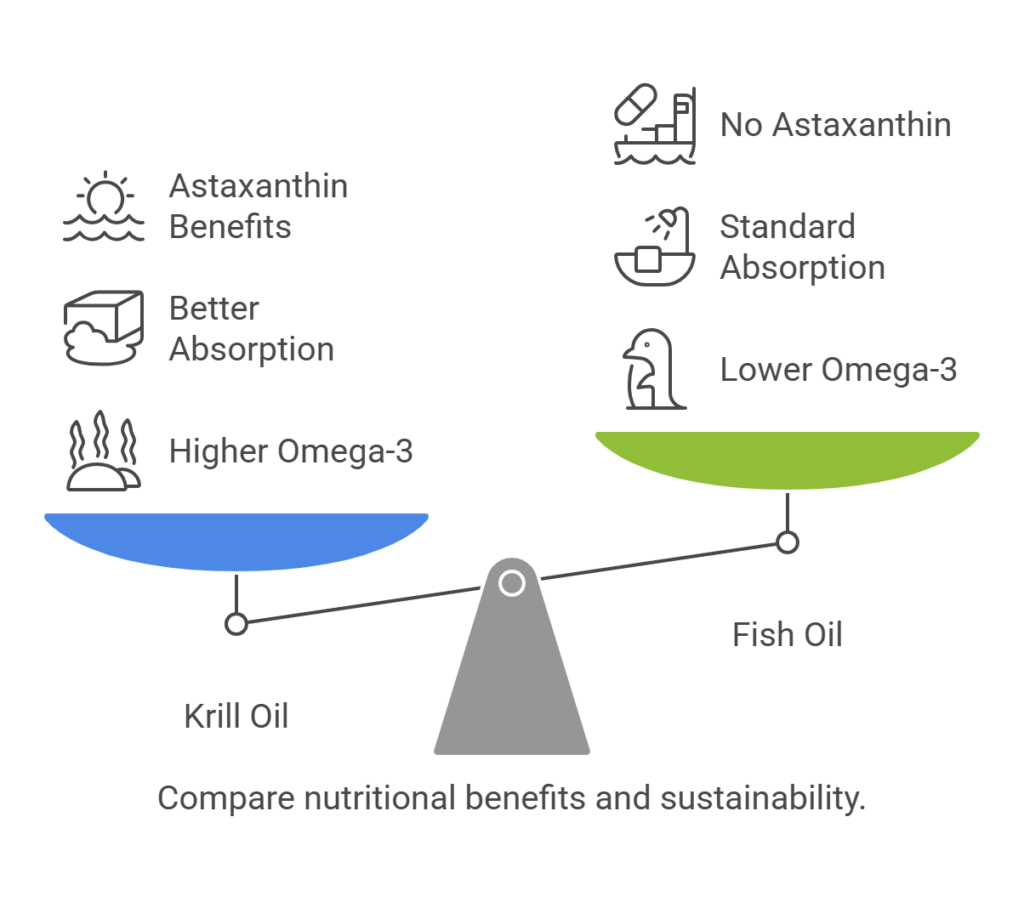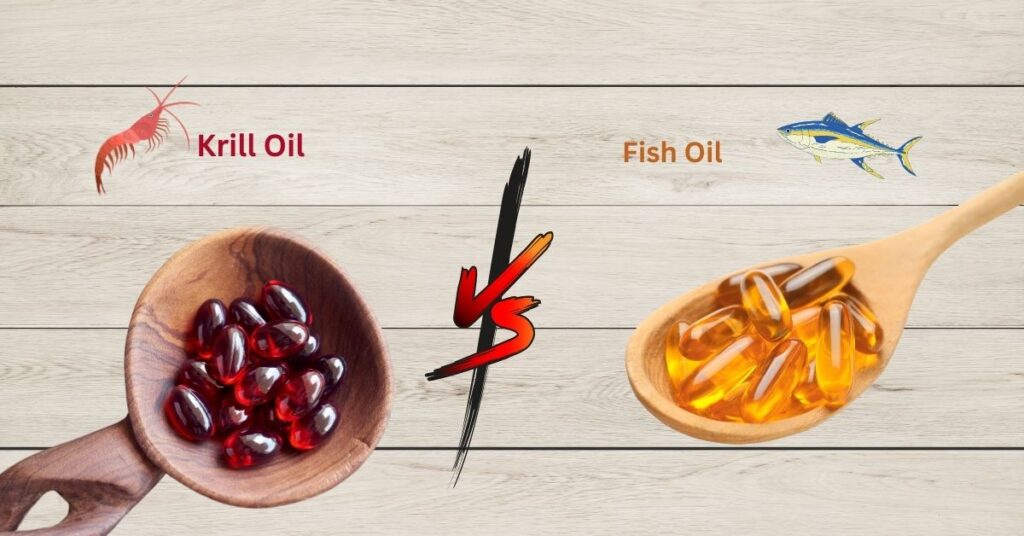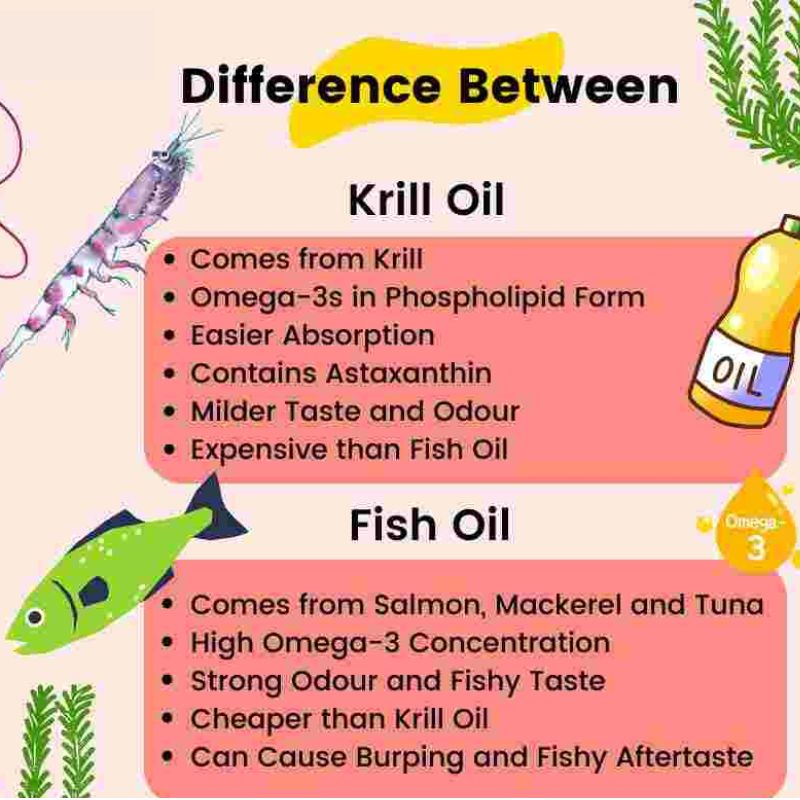Omega-3 fatty acids are one of the most important nutrients for your overall health. They play a key role in supporting your heart, brain, joints, and even skin. Yet, despite their importance, many people don’t get enough omega-3s in their diet. That’s where supplements like krill oil and fish oil come in, both offering a rich source of these beneficial fats.
While fish oil has long been the go-to source, krill oil is quickly gaining recognition for its unique advantages. So, how do these two sources stack up against each other? Which one offers better absorption, greater benefits, and a more sustainable option?
In this article, we’ll compare krill oil and fish oil, diving into the differences in their nutrients, bioavailability, and health benefits. This will help you make an informed decision on which omega-3 source is best suited for your health goals. Let’s get started.
What Are Omega-3 Fatty Acids and Why Are They Important?

Omega-3 fatty acids are essential fats that your body can’t produce on its own, which means you must get them from your diet or supplements. Think of them as vital building blocks, supporting everything from reducing inflammation to maintaining heart, brain, and joint health. Without enough omega-3s, your body can struggle to function properly.
There are three main types of omega-3s: ALA (alpha-linolenic acid), EPA (eicosapentaenoic acid), and DHA (docosahexaenoic acid). ALA mainly comes from plants, while EPA and DHA are found in marine oils, like krill and fish oil. Of these, EPA and DHA are the most important they help regulate inflammation, boost brain health, and protect your heart.
The beauty of omega-3s is that they don’t just support one part of your body; they work together to keep everything running smoothly. From lowering the risk of heart disease to improving brain function and easing joint pain, omega-3s are essential for your long-term health.
Krill Oil vs. Fish Oil: A Comparison of Nutritional Benefits
When it comes to omega-3 supplements, fish oil has long been the go-to choice. But krill oil is emerging as a strong competitor. Both offer impressive health benefits, but they differ in several important ways. Here’s a breakdown of how they compare.

Omega-3 Content
Both krill oil and fish oil are rich in omega-3s, particularly EPA and DHA, which are essential for heart, brain, and joint health. However, fish oil typically contains higher concentrations of omega-3s. That said, the omega-3s in krill oil are more easily absorbed by the body due to their phospholipid structure, making them more efficient for some people.
Bioavailability and Absorption
One of the biggest differences is how the body processes these oils. Krill oil’s omega-3s are bound to phospholipids, which are more easily incorporated into cell membranes. This means they’re more bioavailable your body can use them faster and more effectively. Fish oil’s omega-3s are bound to triglycerides, which take more time to break down and absorb.
Astaxanthin: The Antioxidant in Krill Oil
Krill oil stands out with its natural antioxidant, astaxanthin. This carotenoid helps protect omega-3s from oxidation, ensuring they stay potent longer. It also provides additional anti-inflammatory and cell-protecting benefits, something fish oil doesn’t offer. Astaxanthin supports skin health and reduces oxidative stress, adding extra value to krill oil.
Sustainability
Krill oil has an edge when it comes to sustainability. Krill is harvested from the pristine, well-managed waters of Antarctica, with strict regulations in place to ensure minimal environmental impact. In contrast, fish oil often comes from large fish populations that are at risk of overfishing, making fish oil a less sustainable option in the long run.
Side Effects and Digestibility
Krill oil is generally easier on the digestive system. Because it’s smaller and more bioavailable, people often report fewer issues with fishy aftertaste or burping. Fish oil can cause these side effects for some, and it can be harder to digest for people with sensitive stomachs. Krill oil also has a naturally lower risk of contamination due to its position lower in the food chain.
Now here comes the good part while both krill oil and fish oil offer health benefits, the decision comes down to personal preference and goals. Let’s dive into how to choose between the two.
Health Benefits: Krill Oil vs. Fish Oil
Both krill oil and fish oil are praised for their omega-3s, but each offers unique health benefits that make them stand out in different ways. Here’s a comparison of their key health advantages.

Heart Health and Cholesterol Control
Both krill oil and fish oil are great for supporting heart health. Omega-3s help reduce triglycerides, lower blood pressure and support overall cardiovascular function. While fish oil is more commonly used for heart health, krill oil may offer superior benefits due to its phospholipid structure, which may help with better absorption and effectiveness in reducing cholesterol levels.
Joint Pain and Inflammation Relief
Omega-3s are well known for their anti-inflammatory properties, and both oils can help reduce joint pain and stiffness, especially in conditions like arthritis. Krill oil, however, has an advantage due to the added benefit of astaxanthin, a powerful antioxidant that helps fight inflammation more effectively. This makes krill oil a top choice for those suffering from chronic joint pain.
Mental Health and Cognitive Function
When it comes to supporting brain health, omega-3s are crucial. Both fish oil and krill oil help improve mood, reduce the symptoms of depression, and support cognitive function. Krill oil’s astaxanthin adds an extra layer of protection, helping to reduce oxidative stress and inflammation in the brain, which may enhance mental clarity and protect against age-related cognitive decline.
Skin Health and Aging
Fish oil and krill oil can both contribute to healthier skin, reducing dryness, irritation, and signs of aging. Krill oil takes it a step further thanks to its antioxidant astaxanthin, which helps protect skin cells from oxidative damage caused by UV rays and pollution. This makes krill oil a great choice for those looking to maintain youthful, glowing skin.
Digestion and Absorption
Krill oil is often easier on the digestive system than fish oil. The phospholipid structure of krill oil allows for faster and better absorption, which means the body can use the omega-3s more effectively. This makes krill oil a better choice for individuals who may experience discomfort or digestive issues when taking fish oil, such as fishy burps or stomach upset.
Now here comes the good part whether you choose krill oil or fish oil, both offer powerful health benefits, but your choice depends on your specific needs and preferences. Let’s look at how to decide which is right for you.
Side Effects and Considerations
When it comes to supplements, it’s important to consider both the benefits and any potential side effects. Krill oil and fish oil are generally safe for most people, but there are a few things to remember to ensure you’re making the best choice for your body.
| Factor | Krill Oil | Fish Oil |
| Fishy Aftertaste & Burps | Less likely to cause fishy aftertaste or burps | More likely to cause fishy aftertaste or burps, especially at higher doses |
| Possible Allergic Reactions | Risk for those allergic to shellfish | Risk for those allergic to fish |
| Blood Thinning & Medication Interactions | May interact with blood-thinning medications | May interact with blood-thinning medications |
| Stomach Upset & Digestive Issues | Generally easier on digestion due to smaller capsules | More likely to cause mild digestive discomfort |
| Environmental & Sustainability Concerns | Considered more sustainable but still has environmental concerns | Sustainability concerns, especially with overfished species |
Fishy Aftertaste and Burps
One of the most common side effects of fish oil is the dreaded fishy aftertaste or burps. Many people find it unpleasant, especially when taking large doses. Krill oil, however, tends to be easier on the stomach, with fewer reports of fishy aftereffects. If you’re sensitive to taste, krill oil may be the better option.
Possible Allergic Reactions
Since both krill oil and fish oil come from marine life, there’s a small risk of allergic reactions, especially for people who are allergic to shellfish or fish. If you have a history of allergies to seafood, it’s important to consult with your doctor before starting either supplement.
Blood Thinning and Medication Interactions
Omega-3 fatty acids, whether from krill oil or fish oil, have blood-thinning properties. While this can be beneficial for cardiovascular health, it may interact with blood-thinning medications like aspirin or warfarin. If you’re on any of these medications, it’s important to talk to your doctor before adding omega-3s to your routine.
Stomach Upset and Digestive Issues
For some people, both fish oil and krill oil can cause mild digestive discomfort, like bloating or indigestion. Krill oil’s smaller, easier-to-digest capsules may cause fewer digestive issues compared to fish oil, but if you’re sensitive, it’s best to start with a smaller dose and see how your body reacts.
Environmental and Sustainability Concerns
While krill oil is generally considered more sustainable than fish oil, there are still concerns about overfishing and the environmental impact of harvesting krill. Look for krill oil that’s certified by organizations like the Marine Stewardship Council (MSC) to ensure the product is sustainably sourced. Fish oil, particularly from overfished species, also raises sustainability concerns.
Now here comes the good part understanding the potential side effects and considerations of both krill oil and fish oil helps you make a more informed decision. Let’s take a closer look at how to choose the right omega-3 source for your needs.
How to Choose Between Krill Oil and Fish Oil
Choosing between krill oil and fish oil depends on your health goals, personal preferences, and any sensitivities you may have. Both oils are great sources of omega-3s, but each has unique benefits that make it better suited for different people. Here’s a guide to help you decide which one is right for you.

Consider Your Health Goals
If you’re focused on heart health, brain function, or reducing inflammation, both oils can help. Fish oil has been studied more extensively and is a reliable choice for general omega-3 supplementation. However, if you’re looking for extra benefits like improved skin health or enhanced joint mobility, krill oil may be your best bet due to its added antioxidant, astaxanthin.
Digestibility and Taste
If you struggle with digestive issues or can’t stand the taste of fish oil, krill oil might be a better option. It’s easier on the stomach and doesn’t leave the fishy aftertaste that fish oil sometimes does. For those with sensitive stomachs or a dislike for fishy flavors, krill oil offers a more pleasant experience.
Sustainability and Environmental Impact
Krill oil is often considered a more sustainable option, thanks to strict regulations on krill harvesting in the Antarctic. If environmental concerns are important to you, look for krill oil that has sustainability certifications like the Marine Stewardship Council (MSC). While fish oil can be sustainably sourced, overfishing of certain fish species can be a concern.
Price and Accessibility
Fish oil is generally more affordable and widely available than krill oil, which can be a factor for those looking for a budget-friendly option. If cost isn’t a major concern and you’re looking for the added benefits of better absorption and antioxidants, krill oil might justify the higher price.
Allergies and Sensitivities
If you have shellfish allergies, krill oil is not the right choice for you, as it’s derived from krill, a type of shellfish. Fish oil, however, is generally safe for most people, unless you have a specific allergy to fish. Always check with your doctor if you have allergies or are on medications that could interact with omega-3 supplements.
Now here comes the good part whether you choose krill oil or fish oil, both provide powerful omega-3 benefits. The key is understanding your needs, preferences, and any health considerations to make the best choice for your body.
Conclusion
Choosing between krill oil and fish oil comes down to your personal health goals, preferences, and lifestyle. Both supplements provide essential omega-3s that support everything from heart health to brain function. However, the key differences in bioavailability, sustainability, and added benefits like astaxanthin make krill oil an appealing choice for many, especially those seeking superior absorption and additional antioxidants.
Fish oil, on the other hand, remains a tried-and-true option for general omega-3 supplementation, often at a more affordable price point. Its extensive research and availability make it a solid choice for those focused on heart health or general wellness.
Ultimately, whether you choose krill oil or fish oil, the most important thing is to make sure you’re getting the omega-3s your body needs. Keep in mind your specific health needs, digestive sensitivities, and environmental concerns, and consult with a healthcare provider if you’re unsure about which option suits you best. With the right omega-3 source, you can support your overall well-being and take a step toward better health.








